The men on the pitch in the early days of LFC were as crucial to its long-term success as those off it, and Elisha Scott is certainly one of the Men Who Made Liverpool.
It’s the early 1900s and we’re in Belfast, Northern Ireland, near the Blackstaff River and within earshot of the industrial mills. The great Harland and Wolff shipyard is churning out ocean liners like the Columbus and the Ionic, while across the Irish Sea, in Liverpool, two football teams vie for supremacy. For now, though, we focus on a patch of land and a group of young boys from Lower Broadway playing football. I say football, but what they’re kicking around is a rolled-up bundle of newspaper. It’s regulation size and it beats the empty can of yesteryear, but it’ll be in shreds when the game is up.
Amongst these lads is a young Elisha Scott. He’s playing up front as a striker in this game, but he will soon become one of the greatest goalkeepers in the history of British football. The story of his conversion to custodian rather than forward was retold in the Belfast Telegraph, in 1959.
“Elisha—a member of a family of 10—was born in the Donegall Road. He attended St. Simon’s School, and, in his early days played as an inside forward and centre-forward with the 4th Belfast Company of the Boys’ Brigade. It was Boys’ Brigade football which converted him from an attacker to a goalkeeper,” the report reads.
“One day he was so annoyed with the ‘keeper on his side that he went up to him and said: ‘What’s the use of us putting the ball into the net, if you are going to let goals in at the other end?’.”
He would go on to make his name at Anfield and Liverpool, where he would spend 22 years and play 468 games. There he would become a king who befriended the Kop and made opposition strikers—and his own defenders—tremble. This is his story.
Scott was invited to Liverpool in 1910 by his brother Billy, who was an Irish international who kept goal for Everton. He was 17 years of age and would spend a week at Goodison Park. Elisha had graduated from playing as a forward on the wasteland and was now a talented goalkeeper himself. He had first played for Broadway United in the Irish Junior Alliance before turning out for Linfield. He had once been described as a “terror of goalkeepers,” but he was now uniquely equipped to outwit any centre-forward. His brother assured him that he would find him a top club in England.
However, Everton felt that Scott was too young and passed up on the opportunity to sign him. Their loss would be Liverpool’s considerable gain, as when Billy recommended him to Anfield’s John McKenna, his fellow Irishman wasted no time in snapping him up. Elisha Scott became a Liverpool player on September 1, 1912.
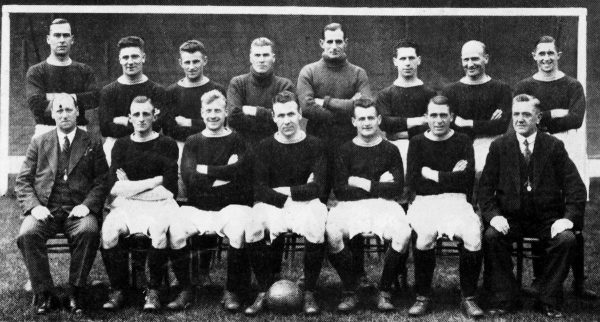
At 5’8½” and barely 11 stone, Scott’s physique wouldn’t have marked him out for a career between the sticks. However his agility, goalkeeping brain and decisiveness would see him nicknamed ‘the Cat’ by supporters. After a single practice match, the board at Anfield made the shock decision to put Scott straight into the first-team setup. He unfortunately injured his wrist, though, and would have to wait until January 1, 1913 to make his debut away to Newcastle United.
According to reports at the time, St James’ Park was packed out, with 35,000 drawn out by the “spring-like conditions” to roar the Geordies on. Both teams were evenly matched in mid-table, but it was the north-east side who took the game to Liverpool, with Newcastle‘s forwards pummelling their goal. Try as they might, though, they could not breach Scott’s line. The papers declared “the fates and Scott were against them.” It was, according to the gentlemen of the press, the “best display of goalkeeping ever seen at St James’ Park.”
A quote from a Liverpool Echo reporter, cited on LFCHistory, declared “hats off to Scott, Liverpool’s youthful guardian. His debut was brilliant and a pleasing augury.” Another newspaper clipping eulogised about the youngster’s star performance:
“It will be remembered that Elisha Scott, the eighteen-year-old custodian, gave a great display for Liverpool against Newcastle United on New Years Day. The youth created much admiration by reason of his ability to prevent the Newcastle sharpshooters from netting the ball.”
It must have been the most remarkable of debuts, because it convinced the Newcastle board to immediately offer a four-figure-sum to Liverpool for his services. A bid, said to be £1,000, was turned down forthwith. That would be the first of two reportedly record bids for his services. According to the Irish News, in a tribute piece written in 2015, an unnamed club bid £10,000 for him in 1928. These are huge sums of money for the period and are yet more evidence of his brilliance.
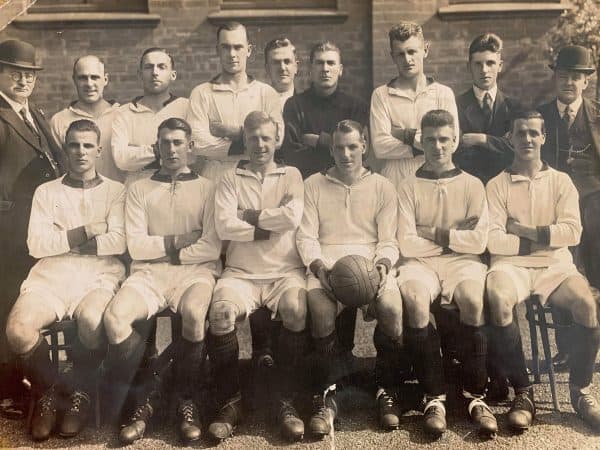
The Reds had plans for Elisha, clearly, but this would prove to be his only start of the 1912/13 season, with Ken Campbell returning to the first team for the remainder of the campaign. He made just four appearances the following year, but his breakthrough came in the 1914/15 season, in which he made 25 appearances in all competitions.
Alas, as is so often the case with players of this time, the war would interrupt a promising career. He would make 15 appearances for Liverpool during the war years, but would return home to Ireland for most of it. There, he would play for Belfast Celtic, a team he would later manage after he left Anfield. The team won the Irish Cup in back-to-back seasons, in 1917 and 1918.
On the resumption of league football in 1919, Scott became an ever-present for more than a decade. His performances included 137 clean sheets, and ensured he would be capped 31 times for Ireland. He was called up in that first season after the war, for a game against Scotland.
These were momentous times, with Europe coming to terms with the aftermath of brutal bloody conflict. Old ideas of imperialism were being challenged. Uprisings took place across the continent and in Russia the Soviet Union had already been established. Britain was not immune, with strikes and riots taking place across the nation. Ireland was no different, and in January 1919 the Irish political party Sinn Fein established a Dublin assembly and proclaimed the island of Ireland an independent state. What followed was a war of independence, which eventually led to the establishment of an Irish Free State and partition in 1921.
It was against this backdrop of turmoil in his homeland that Elisha was asked to represent his country. Commenting on the day he received the call, he explained that he could scarcely believe that someone as young as him could receive such an honour. This is what he said of the callup, in an interview with the Manitoba Free Press, in 1939:
“In 1919, football recommenced after being stopped by the war. But in my opinion there was a far more important happening in the football world. The Irish selectors found a young broth of a boy playing goalie for Liverpool and decided that no other should represent them in the Victory International against Scotland.
“That same broth of a boy was Elisha Scott, and never will I forget the day I learned that the Emerald Isle was requiring the services of myself. I was playing, as I say, with the Liverpool club, and when the manager came to me one morning and told me that I was wanted by the Old Country to play against the Scots, at Ibrox Park, I wagged my head very wisely and said, ‘the other leg is better far for pulling, it’s got bells on’.
“It took the manager half an hour of powerful argument and much waving of official notes before I could believe that such great honour had come to the same boy.”
Sadly, the Scots ran out 2-1 winners in the first of two games, which was played at Glasgow’s Celtic Park. This is how Scott recalls the day and the game:
“The journey to Scotland took, I believe, about eight hours, but Elisha Scott thought it was a hundred hours. The nearer I got to Glasgow the further I wished I was away. I was as nervous as a sheep on the way to the butcher, and felt very much like the sheep would.
“The first of that game was too rapid for me. I stopped one or two easy pots and began to feel like a goalie at last. Then some spalpeen ousted the rules inside the area and Andy Wilson, the Scots’ centre, came up to take the free pot.
“I believe he scored. I don’t know. The referee said so, the crowd said so, and next day’s paper said so, and therefore he must have done. But I never saw that ball go past.”
It was clearly a rude awakening for the youngster, but Scott would see his team equalise and vowed that the Scottish would not get past him again. Alas, this was to be an international baptism of fire:
“Soon after that the lads took the ball to the Scots and gave them a spot of running to do. Billy Halligan, the Hull City laddie, gave the ball a thundering kick, and I had the pleasant sensation of seeing my Scots’ counterpart fish the ball from where all the good shots go to.
“Hurrah, I thought. One each, and they don’t come through here while there’s a breath in my body. They didn’t either, for although they scored another goal I had no breath in my body when they did it. Donaldson, the outside-right, who used to play with Bolton Wanderers, sent in a centre. It was rising quickly and the wind was bringing it in. With that touch of the Irish which makes the whole world grin, I dashed out of the citadel and grabbed the ball.
“A flashing thought of congratulation struck me just a split-second before a flashing body hit me in the ribs and I sat upside the net with the ball in my lap. The second goal was also the property of Andy Wilson.
“It was a very subdued Elisha Scott that returned to Liverpool that day, and I felt sure that never again would I play for my country. You can judge my surprise therefore when I was told that I had to play in the return match at Windsor Park, Belfast—these were Victory Internationals, you understand.”
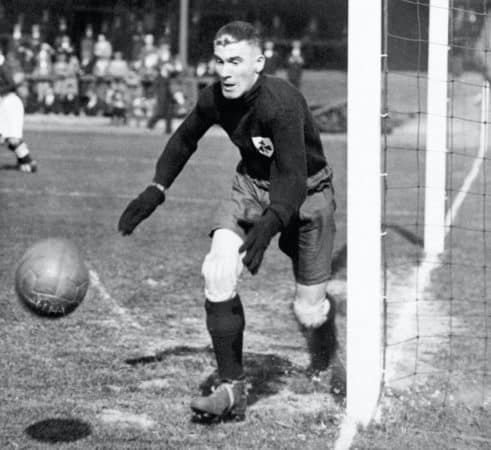
By all accounts, the return match in Belfast was something of a feisty affair, and the Scots would be entering a cauldron of partisan Irish support. This description of Scott’s encounter with a young Irishman before the game tells its own story.
“The crowd at Belfast was after my own heart, and the good old brogue came kindly back to my ears. The cheers which rent the air when ‘we’ took the field were as sweet music,” Elish recalled.
“I remember very distinctly a remark made to me by a bonny boy from the hills. The boy was dressed up in traditional Irish costume. His cheeks were somewhat rosy, more by acquaintance with the potsheen than with fresh air, and in his hand he wore, or grew, as we say, a shillelagh.
“This potent weapon he handed down to me with a profound observation: ‘If they git so close to be lolke danger give ‘em a kiss wi’ the ould magic wand and they’ll trouble divil agin’.
“I was tempted to slip the easy stick up my jersey, but refs are sometimes rather finicky.”
The game would end goalless, with the Irish missing a penalty. Elisha said that it broke his heart. However, after tasting the nerves of an international debut and the fire of such a partisan atmosphere, nothing could ever phase Elisha Scott again. It was an experience he carried with him throughout his career.
Back home in Liverpool, Elisha would experience hitherto unparalleled glory with Liverpool between 1921 and 1923. The team would win the First Division in successive seasons for the first time in their history. Scott missed just three games in the 1921/22 season and played in every game of the next—81 appearances in 84 games.
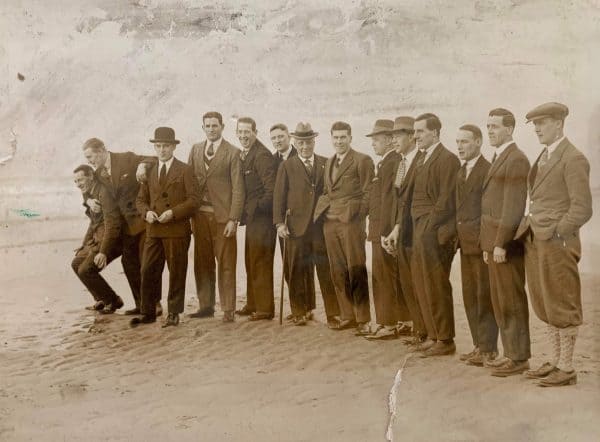
Writing in the Topical Times on August 27, 1938, Tom Bromilow described Elisha as being “as safe as the bank of England.” He also sheds light on a player who, while not exactly looking the part, was every inch a master of his trade and utterly obsessed with it. He discussed how Scott would arrive at the ground two hours before a game, and would be ready for action by the time the rest of the team arrived in the dressing room. He would compensate for his small frame by wearing three pair of socks and three sweaters for the game. Elisha would also insist on bouncing the ball on the dressing-room floor, handling it intently in order to get a feel for it.
These insights suggest that he was one of many in that Liverpool team who thought seriously about the game and how it was played. They were the aristocracy of British footballers and Scott was the King. To Elisha, football was a serious business and the job he did was every bit as special as any outfield players’ was. In an article about the role of ‘keeper in the Topical Times, dated February 25, 1938, he had this to say:
“First forget that schoolboy stuff about ‘any mug’ doing for goal. Forget that old joke about it being cheaper to board up the goal. Forget that old tag about footballers (and fast bowlers) being mad.
“Get it into your head that a goalkeeper is as important, if not more so, than a centre-forward. A centre can make a mess of things and a pal will come to his aid. If a goalie makes a mess of things, he’s sunk. A goalkeeper is a footballer.”
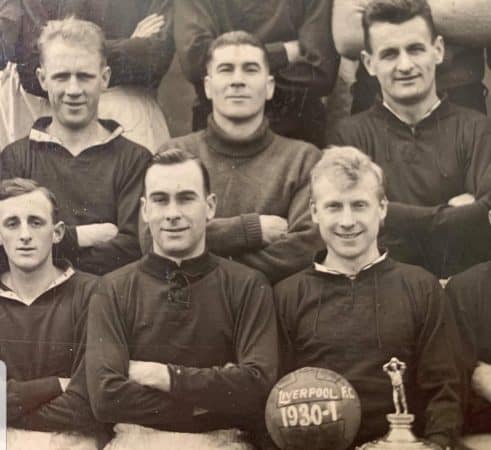
Elisha Scott elevated the art of goalkeeping at Liverpool. His experiences playing as a forward, on that patch of wasteland in Belfast all those years before, would give him a good understanding of what a striker would do in any number of situations. He would insist on playing up front in practice games in order to “get in the mind of the forward.” His philosophy was perhaps summed up best with this advice to aspiring ‘keepers: “Find out what the centre wants you to do, and then don’t do it.”
He wrote extensively about his art, explaining that “goalkeeping is about anticipation and a knowledge of angles. There are only so many angles a ball can leave a forward’s boot and only so much space he can shoot at. A goalkeeper’s job is to give him as few angles as possible to shoot at.”
Elisha was the master of his domain and thoroughly commanded the box. He refused to allow his own defenders to crowd him in the penalty area, often ordering them out of it with what was euphemistically described as “industrial language.” Some found it funny, others did not. One such player was Jimmy Jackson, a left-back who played for the Reds between 1925 and 1933. Dixie Dean once recalled how the player had turned to him after the Everton striker had scored the Blues’ third goal in the game, and after facing a barrage of abuse from Scott who blamed the defender for the goal and said, “William, I shall never play in front of this man again.”
Jimmy, who was known as ‘the Parson’, was clearly more suited to a career in the clergy, which he duly joined upon leaving football. However, Elisha was a master craftsman. He knew the goalkeeping art inside out and he had earned his status in the Liverpool goalmouth as untouchable and, it seemed, he was also unquestionable.
On September 30, 1931, the Daily Mail wrote:
“Scott never exhibits tricks in goal. He catches balls that others would fist; he puts the ball over the bar for a corner when others would be spectacular in clearing. Scott never takes a chance, and if you study those goalkeepers who have gained fame you will find that it was because of this trait. It would be easy to say Scott has anticipation, but telling why he has this gift is much more difficult. Personally, I think it is because he never takes his eye off the ball.
“I do not mean when it is likely to come to him: all goalkeepers must do that. But Scott, if you watch him when there is little chance of him having to save, is moving about in goal in accordance with the position of the ball. He knows that a freak shot will change an angle, so before the ball comes he is protecting the goal from that angle. You never catch him unready.
“Perhaps the greatest test of a goalkeeper is his judgment in running out of goal. If Scott goes he gets the ball. You never see him losing a race and finding the ball going into an untenanted goal. You never see him prancing about the penalty spot when a corner kick has been taken.
“He leaves the backs to do their job and never interferes—but let an opponent get clean through and then see Scott come out. He then comes quickly, and the forward has to be quick or the opening at which to shoot will be very narrow.
“But one could go right through a goalkeeper’s task, discuss it in detail, and have to admit with each detail, that that is the way Scott does his job.”
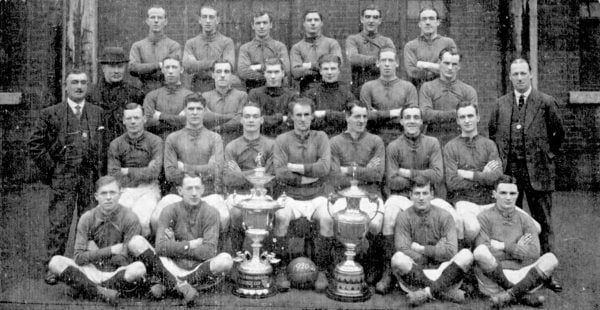
Elisha enjoyed many rivalries in the game, perhaps none more so than with Dixie Dean, the prolific Everton forward. In reality the pair were best of friends off the field. And the tales of their many encounters—some real, others greatly exaggerated but entertaining and informative nonetheless—are legendary. Interestingly, though, Elisha would describe a different striker as his greatest ever “bogey man.” That player was Chelsea‘s Andy Wilson.
Wilson played 238 times for the Londoners, notching 59 goals. But it was against Scott that he seemed to have the most joy. In 1931, Elisha would say this of the Scottish forward: “Everywhere I go he follows me. And every time he has his own way.
Despite his caustic nature, Elisha made many friends in the game, including journalists who had felt his wrath whenever they wrote something he disagreed with. They admired him and respected him nonetheless. However, no friendship was as keenly felt than the one he struck up with the Kop at Anfield. It is said that he would engage the crowd in conversation before and after the game, and on the Mersey Ferry as he travelled to the match. Many thought they were confidants of his.
One story tells of how a supporter climbed out of the stands during a game at Blackburn, in which Scott had pulled off an incredible acrobatic save, only to plant a kiss on the keeper’s cheeks. Another describes an encounter in which Elisha had been engaged in a lengthy conversation with a supporter who was behaving like they were old mates.
In the end Scott would ask, ‘I’m sorry, do we know each other?’. ‘I should think so’, replied the fan, ‘we were talking to each other at the game last week’.
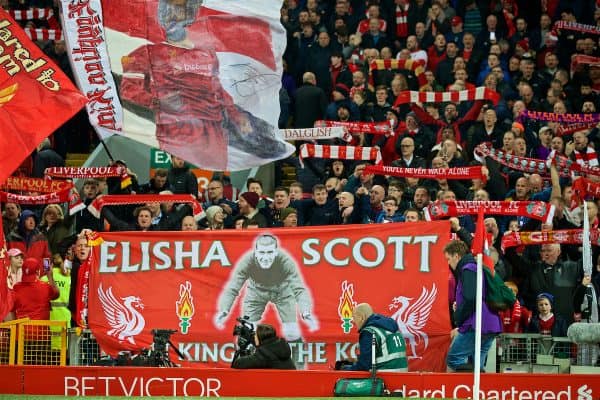
The Kop felt such an affinity with their No. 1 that they dedicated one of their earliest chants to him. “Lisha, Lisha” would be the cry, as he went about his business on the green grass of Anfield. It is little wonder that grown men wept during his farewell game. After the final whistle he addressed them, from the Main Stand on an old speaker system, as “my friends on the Kop,” proclaiming “you have inspired me.”
Scott left Liverpool for his beloved Belfast Celtic in 1934. He would go on to manage them to great success. He is undoubtedly Belfast’s, if not Ireland’s, greatest footballer. He was an undisputed King of the Kop and his performances for the Reds were what helped make Liverpool.
* Additional photographs courtesy of the Wadsworth and Bromilow families.
The Men Who Made Liverpool
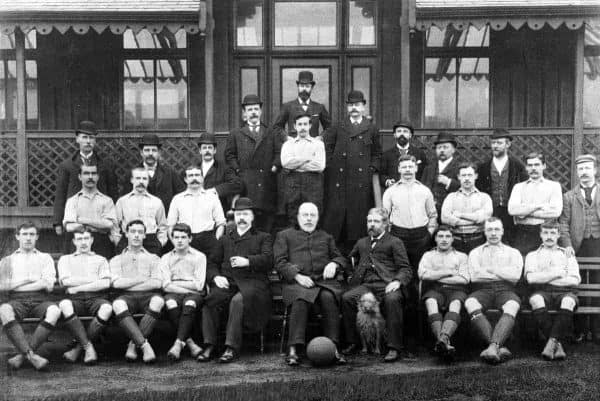
- ‘Honest’ John McKenna, the boy from Ireland who built an empire
- William Edward Barclay, the founding father whose life ended in tragedy
- Walter Wadsworth – Bootle’s fearless fighter, joker and skilful half-back
- George Patterson, the steady hand with an eye for talent
- Tom Bromilow, the superstar half-back they called an “artiste to the fingertips”
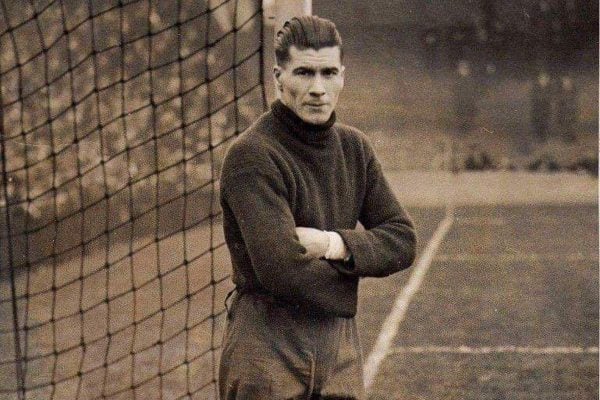

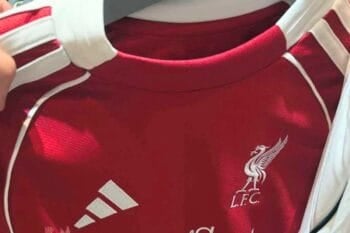
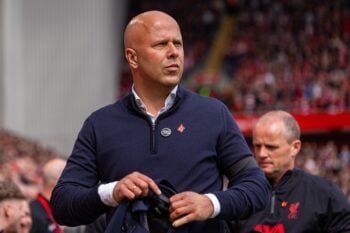
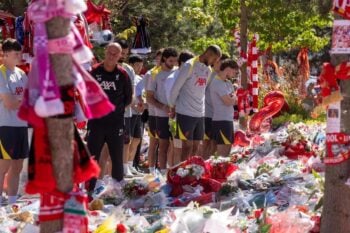

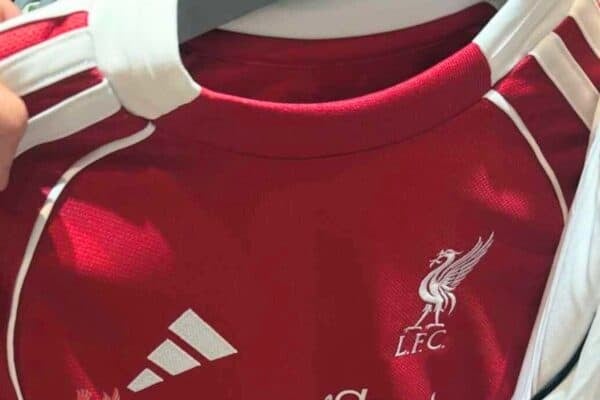

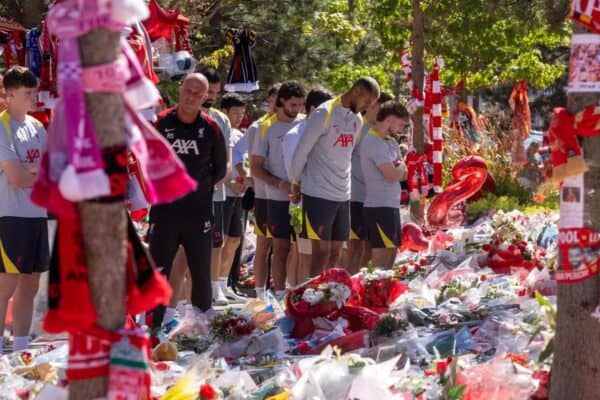










Fan Comments